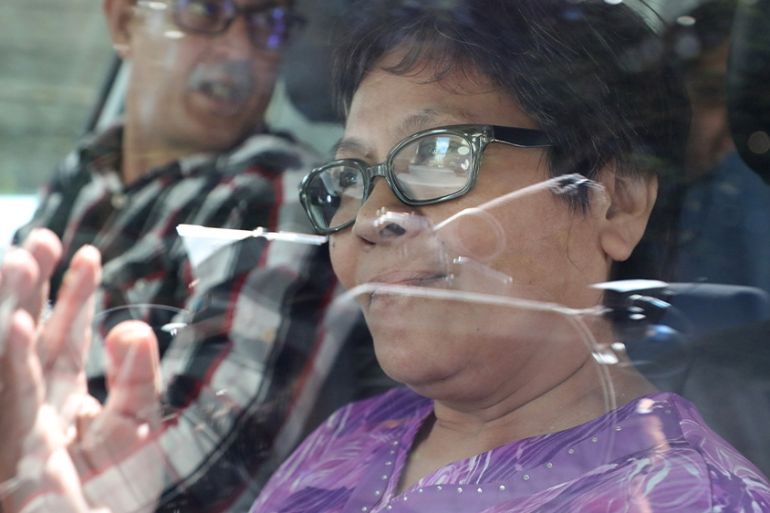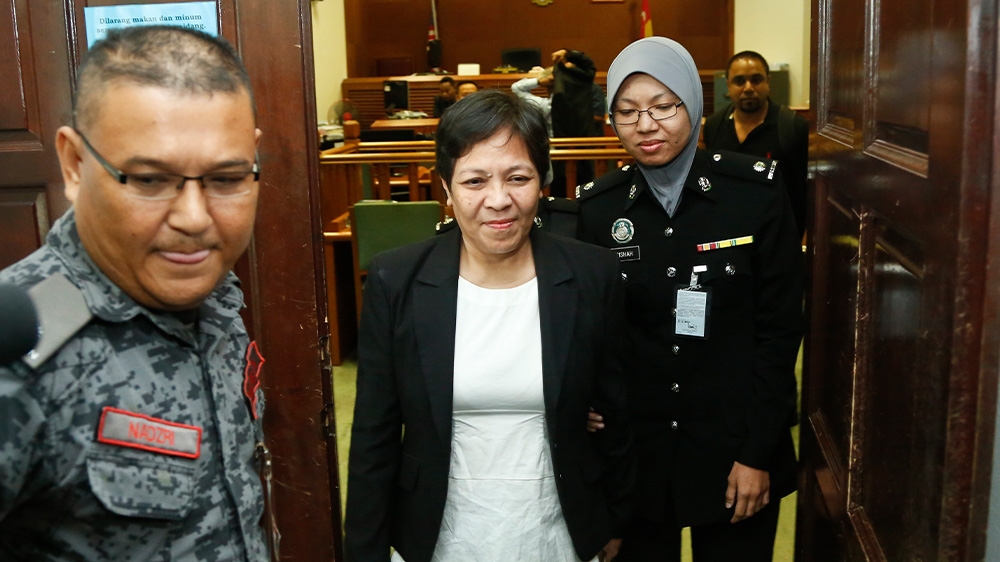Malaysia court overturns death penalty for Australian grandmother
In unanimous decision, Federal Court rules drug trafficking conviction of Maria Elvira Pinto Exposto unsafe.

Putrajaya, Malaysia – Australian grandmother Maria Elvira Pinto Exposto escaped the gallows on Tuesday when Malaysia’s highest court overturned her conviction for trafficking crystal methamphetamine.
Exposto was arrested at the Kuala Lumpur International Airport (KLIA) in 2014 after being found with 1.1 kilogrammes (2.4 pounds) of the drug in her bag and had spent more than five years in prison.
Keep reading
list of 4 itemsRecord number of people executed for drug offences in 2023
Executions in Iran hit 8-year high in 2023
Australian writer Yang Hengjun sentenced to death on China spy charges
The 55-year-old was facing the death penalty under Malaysia’s Dangerous Drugs Act, where anyone caught with at least 50g of crystal methamphetamine is considered a trafficker.
Her son, Hugo, who was in the Federal Court for the decision, was elated.
“I never had any doubt she would be freed,” the 38-year-old said, blinking back tears.
Exposto, who is expected to leave Malaysia in 48 hours, smiled as she left the court in a car.
Her lawyers claimed she was the victim of an online love scam and was duped into carrying a backpack with methamphetamine sewn inside by a “friend” of her boyfriend.
Prosecutors had argued that “love sickness” was no defence for drug trafficking.
But Chief Justice Tengku Maimun Tuan Mat of the Federal Court overturned the death sentence that had been imposed by the Appeal Court.
“This is unanimous decision. We find the conviction is unsafe, the appeal is allowed, the sentence is set aside and the appellate is acquitted and discharged,” Tengku Maimun told the court.
Online scam
Exposto, who lives in Cabramatta West in Sydney, was initially found not guilty by a lower court, which accepted her defence that she was set up in an online scam by a man who identified himself as “Captain Daniel Smith” and claimed to be a US soldier stationed in Afghanistan.
The prosecution appealed against that decision and Exposto was convicted by the Appeal Court. She was sentenced to death – the only option for the court – early last year.
Her lawyer Muhammad Shafee Abdullah told the court she fell in love with a man – who called himself “Captain Daniel Smith” – she had met online.

She had a two-year relationship conducted via Skype with the purported “Captain”.
In December 2014, she was given a ticket to go to Shanghai, purportedly to sign some documents that would enable Captain Smith to be released from service in Afghanistan. But she never met him.
Instead, Exposto was met by a stranger who claimed to be Captain Smith’s friend.
The “friend” gave her a flight ticket to Melbourne and a backpack he claimed contained Christmas gifts for his relatives who lived in the city.
“He asked her to help him bring it to Melbourne and said someone would collect it from her at the airport,” said Shafee, adding that she thought the backpack contained only clothes.
While in transit at Kuala Lumpur airport, Shafee said “Maria didn’t know” she did not need to come out of the transit zone in order to change planes, and followed the other passengers through immigration.
Customs officers testified she “voluntarily” placed her 3 pieces of hand luggage through the scanner.
“That’s how she got caught,” Shafee said. “Her behaviour is totally consistent of innocence.”
He added that even the custom’s officers who testified in court had agreed she was “naive”.
Debate on death penalty
There is currently a moratorium on applying the death penalty in Malaysia as legislation is pending that will remove mandatory death penalties for trafficking and give judges greater discretion in sentencing. More than 1,000 people are on death row, most of them for drug offences.
After the court hearing, Shafee hailed the judgement as a significant precedent for internet scams involving drug cases, He said he would be writing down the judgement in English so that it could be published in the Commonwealth Law Journal.
“It will become a precedent in the Commonwealth… if not in the Anglo-speaking world,” said Shafee.
“This judgement has high impact on judges who have been conservative lot. They will not readily recognise what is in the internet world, internet scam. People asked how could you fall in love over internet. This is a daily happening,” said Shafee.
Shafee said the judgement would also have an impact on Malaysia’s current debate on abolishing the death penalty.
“What does it (Maria’s case) say…that judges are only human, they can make human error and someone can get hanged,” Shafee said. “So it is better to remove the death sentence and give a chance for others who may be equally innocent.”